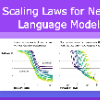Pioneering advancements in large language model-powered agents have underscored the design pattern of multi-agent collaboration, demonstrating that collective intelligence can surpass the capabilities of each individual. Inspired by the neural scaling law, which posits that increasing neurons leads to emergent abilities, this study investigates whether a similar principle applies to increasing agents in multi-agent collaboration. Technically, we propose multi-agent collaboration networks (MacNet), which utilize directed acyclic graphs to organize agents and streamline their interactive reasoning via topological ordering, with solutions derived from their dialogues. Extensive experiments show that MacNet consistently outperforms baseline models, enabling effective agent collaboration across various network topologies and supporting cooperation among more than a thousand agents. Notably, we observed a small-world collaboration phenomenon, where topologies resembling small-world properties achieved superior performance. Additionally, we identified a collaborative scaling law, indicating that normalized solution quality follows a logistic growth pattern as scaling agents, with collaborative emergence occurring much earlier than previously observed instances of neural emergence. The code and data will be available at https://github.com/OpenBMB/ChatDev.
翻译:暂无翻译




